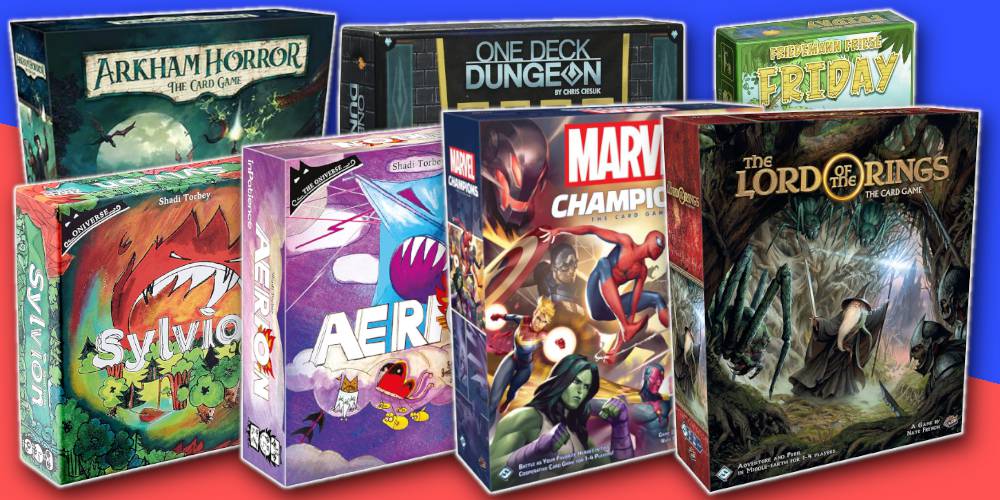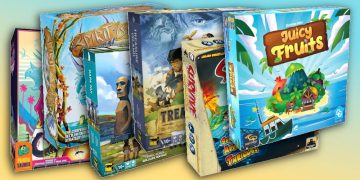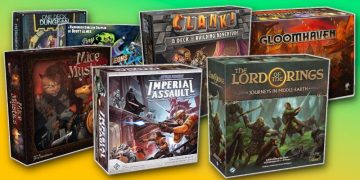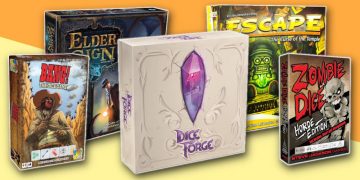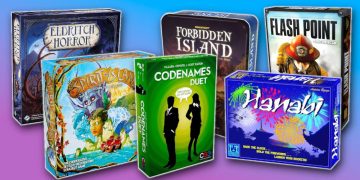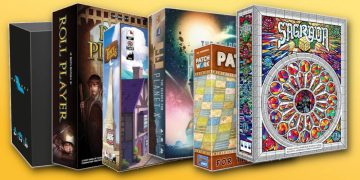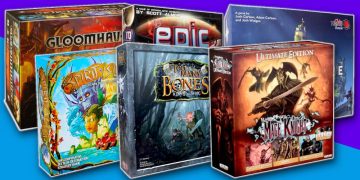The older I get, the harder I find it to gather friends for a night of board games. That's why I've been looking to expand my collection of single-player board games—and in particular, card games.
Generally, I prefer the tactile experience of cards over game pieces. You can hold a bunch of them in your hand. They display more information than tokens and meeples. They're easier to collect and stow away when you're done playing. They're less fiddly overall.
Sadly, single-player card games aren't as common as group card games, and a lot of the ones that do exist are lacking in the kind of gameplay depth you'd more easily find in full-on board games.
That said, there are several fun solo card games out there worth playing. Here are some of the best single-player card games you can play alone. Consider adding them to your collection!
Note: All of these games are primarily driven by cards, but may also involve other game pieces like dice and tableaus. If cards make up the core gameplay, I consider them to be card games.
12. Hostage Negotiator
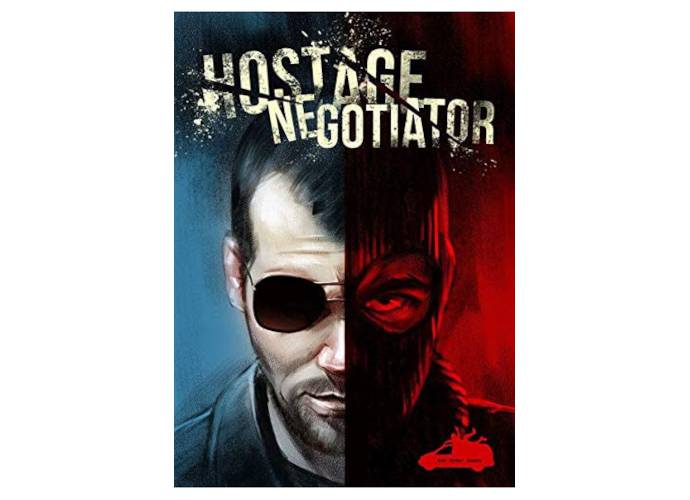
Hostage Negotiator puts you in the role of a law enforcement agent who needs to talk down someone who's taken hostages.
The gameplay involves a card-based hand-building mechanic along with dice, and each turn represents a conversation with the hostage taker. You have to be smart and strategic with your hand, making sure to increase conversation points while lowering the threat level.
And there are multiple paths to victory, whether that means successfully talking them down, sending in an extraction team, and more.
There are several expansion packs for Hostage Negotiator that each introduce new scenarios and more challenges to take on.
11. Palm Island
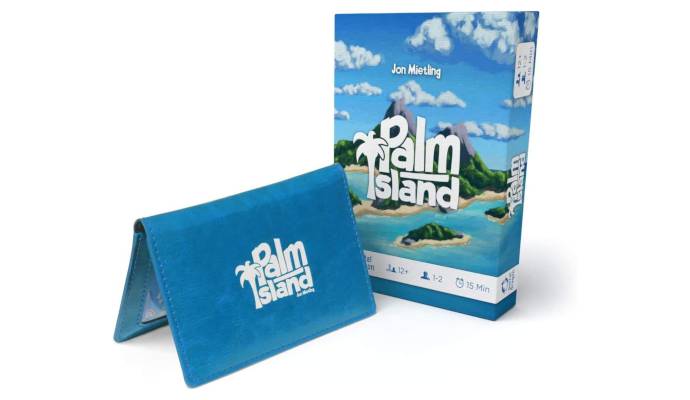
Designed by Jon Mietling
Supports 1 to 2 players
About 15 to 20 minutes
Simple complexity
7.1 on BGG
Palm Island is an awesome little card game that doesn't even require a table to play. As the name suggests, you just need one hand to play.
The gameplay involves gathering resources and curating your island, which consists of all the cards you can hold. Seriously, the name is a proper pun: this island is one that fits in the palm of your hand.
While Palm Island can be played with two players (either cooperatively or competitively), it's really the kind of game that's better off alone—especially because it's so portable that you can play it ANYWHERE.
10. One Deck Dungeon
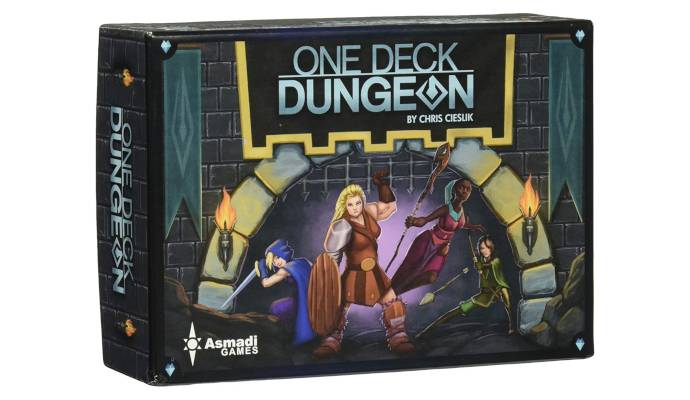
Designed by Chris Cieslik
Supports 1 to 2 players
About 30 to 45 minutes
Simple complexity
7.0 on BGG
One Deck Dungeon is the physical card game manifestation of a roguelike video game: you build a character from the ground up while exploring a dangerous dungeon that's different every time.
Of course, it's also heavily simplified—it is, after all, entirely contained within a single deck of 54 custom cards. Fortunately, it packs a lot of punch because each card serves multiple purposes.
Not only do cards represent the monsters and hazards you encounter in the dungeon, they also turn into your experience, equipment, and abilities when you defeat them.
The deeper you go into the dungeon, the more dangerous it gets—up until you reach the dungeon boss.
Note: There's a standalone expansion called Forest of Shadows that can be played on its own or combined with the original. It has a few more mechanics that increase the fun and challenge.
9. Friday
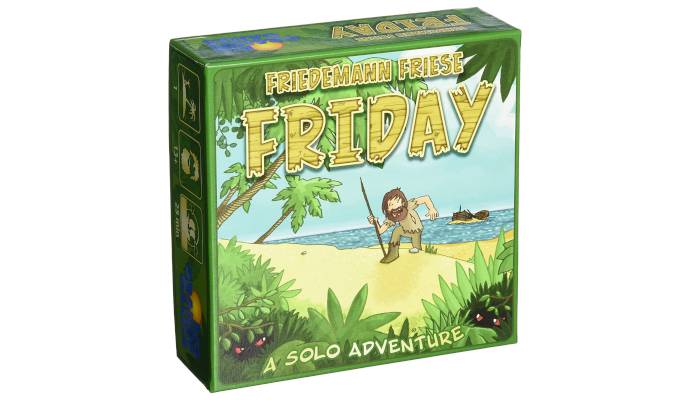
Based on the story of Robinson Crusoe, Friday has you playing as his companion Friday, whose goal is to help Robinson Crusoe survive the island and prepare to fend off the pirates that are en route.
The gameplay of Friday centers on a deckbuilding mechanic where you need to collect new cards and optimize your deck over time in order to become better at defeating hazards and earning fight cards.
Meanwhile, you also have to make sure you play carefully so you don't lose too many life points—or else he won't survive!
Friday is a superb solo card game for anyone who likes the idea of building and optimizing decks on the fly, mixed with RPG adventure elements.
8. Orchard
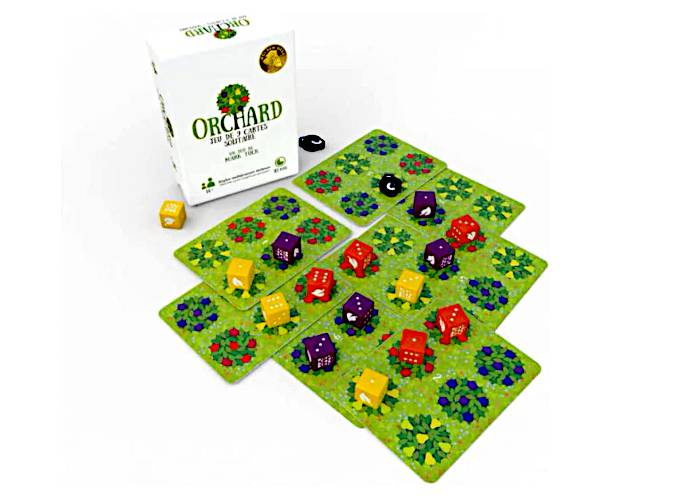
Orchard is a clever tile-laying strategy game that's comprised of nine cards—the cards themselves are the tiles.
Each card has an assortment of six trees on it. The goal is to grow your orchard by playing cards in a way that overlaps with the tree cards already in your orchard. Dice are used to track the harvest of each fruit.
Despite simple rules, Orchard has more depth and replayability than you might expect from a game of this size. It qualifies as a micro-game—it only takes 10 minutes to play—so it's a great option that you can bust out whenever you need a short break.
7. Sylvion
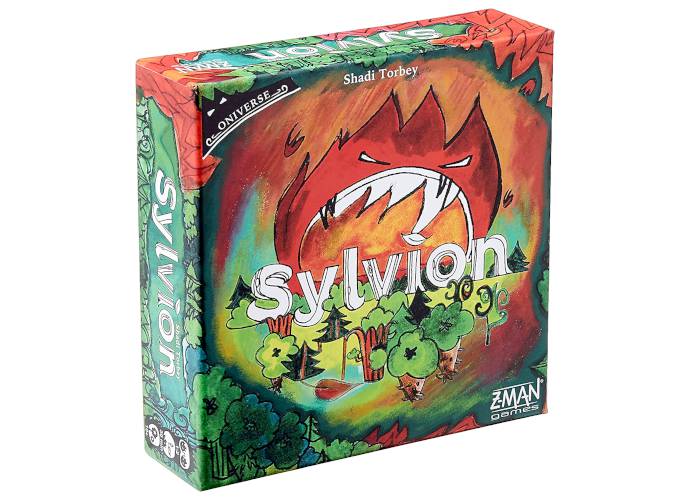
Designed by Shadi Torbey
Supports 1 to 2 players
About 20 to 30 minutes
Simple complexity
7.1 on BGG
Sylvion is a tower defense-style card game where you build a deck of cards through drafting, then play your cards to defend against waves of attacks.
As the Fire Elemental bears down on your forest, you must do everything you can to keep your forest alive. The cards are played in front of you, with the play area consisting of four rows that represent the enemy waves.
While the game is playable with two players cooperatively, it's better played alone. Sylvion has an easy mode and an advanced mode, as well as expansions and extra challenges if you want to go real hard.
Note: Sylvion is part of the Oniverse, a series of lightweight board games that can all be played solo or cooperatively. If you like Sylvion, consider checking out the rest of the series.
6. Food Chain Island
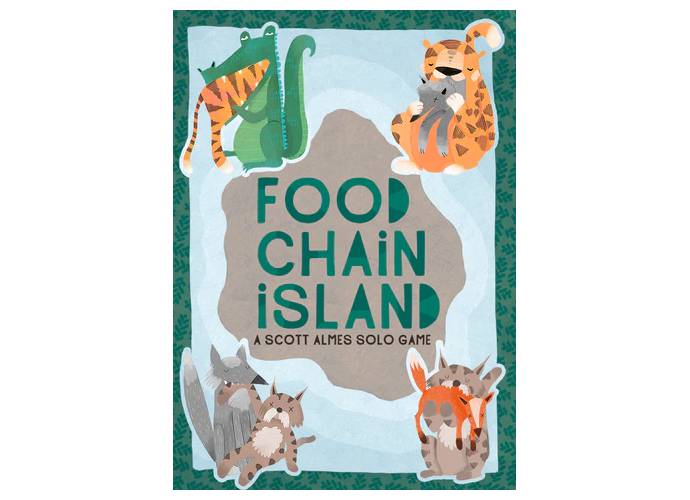
Food Chain Island is a spatial puzzle card game that's played using a deck of 18 cards: 16 of those cards are placed in a 4x4 grid while the remaining 2 cards act as wild abilities.
Of the 16 main cards, each one is numbered from 0 to 15, and each one can only "eat" the three cards directly below it (e.g. the 8 card can only eat cards 7, 6, and 5). Each card also has a special ability that activates when it successfully eats another card.
The ultimate goal is to end with a single animal at the end of the game. If no valid moves are left before you can get to that point, you lose.
Food Chain Island is a very thinky game where you'll need to look several moves ahead in order to reach victory—but if you don't care too much about winning, it can be relatively stress-free as you just move animals around and see how far you can get. Either way, it plays quickly!
5. Sprawlopolis
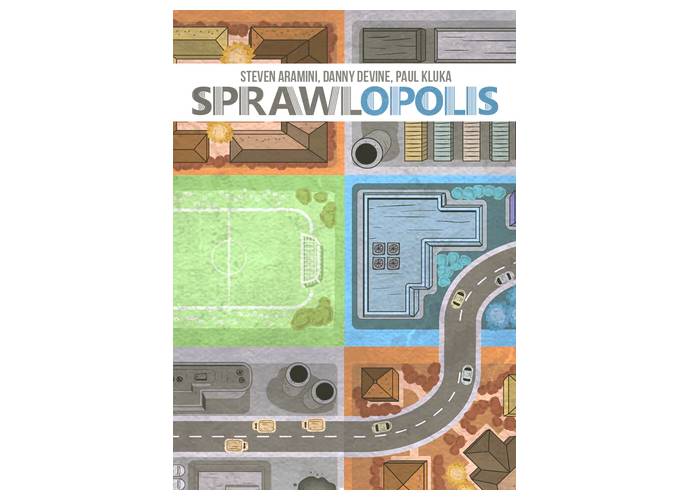
Designed by Steven Aramini, Danny Devine, Paul Kluka
Supports 1 to 4 players
About 15 to 20 minutes
Simple complexity
7.4 on BGG
Sprawlopolis is one of the greatest solo card games ever made, mainly because it's so engaging in a thinky and puzzly way without ever being stressful or overwhelming. It's actually quite relaxing!
In this game, you play with a deck of 18 city cards. Each card has four quadrants—one for each type of district between Residential, Industrial, Commercial, and Park—as well as potential roads.
Your goal is to place cards (either adjacent to or overlapping) to create the largest regions you can of each district type. However, each separate road subtracts points at the end, so you want to connect roads as often as possible. You also have three randomly chosen goals every time.
Sprawlopolis is a quick, simple, clean little puzzle of a game that's compact so you can carry it with you anywhere you go.
4. Aerion
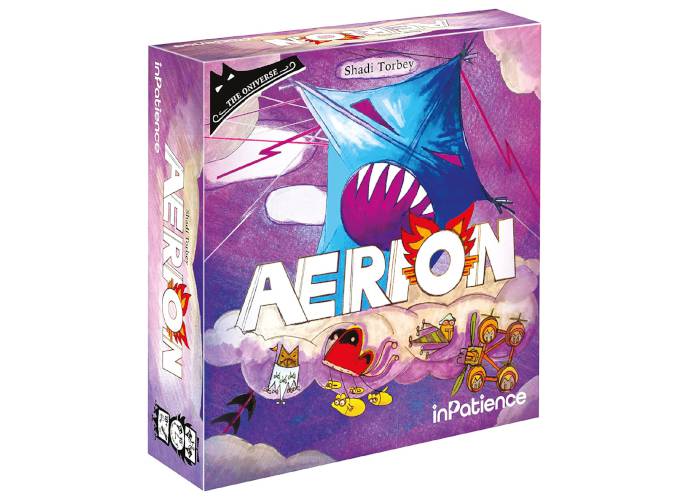
Designed by Shadi Torbey
Supports 1 to 2 players
About 15 to 30 minutes
Simple complexity
7.3 on BGG
In Aerion, you're an inventor of flying machines who's tasked with building a fleet of airships.
To gather airship components, you roll dice. You can throw away resources to fudge your dice roll results, but don't go too crazy or else you won't have enough to complete your fleet. On top of that, you'll need to acquire the necessary blueprints and hire a helpful crew.
Aerion is primarily a card game that's great whether you play it solo or cooperatively, and it only demands half an hour. If you end up liking it, there are six expansions that evolve the game even further.
3. The Lord of the Rings: The Card Game
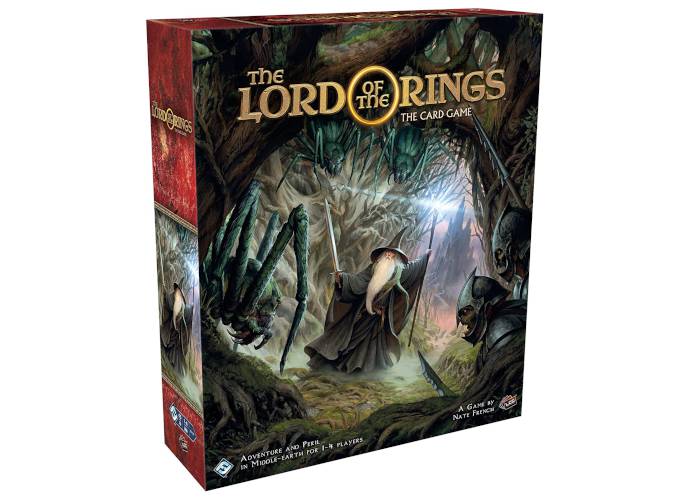
Designed by Nate French
Supports 1 to 4 players
About 30 to 60 minutes
Advanced complexity
8.5 on BGG
The Lord of the Rings: The Card Game is a living card game, which is like a collectible card game except you don't buy cards individually or in booster packs—you buy preset adventure packs instead.
In this deck construction game, you build up a deck of cards that include heroes, allies, events, and attachments. You'll be drawing and playing these cards to achieve victory against enemies.
The Lord of the Rings: The Card Game is played in campaign style, where each session involves a particular scenario that has several objectives you need to complete before the forces of darkness overwhelm you.
For fans of Tolkien's Middle-Earth, few board games offer the same depth and narrative intrigue as this one—and this is just a card game!
2. Marvel Champions: The Card Game
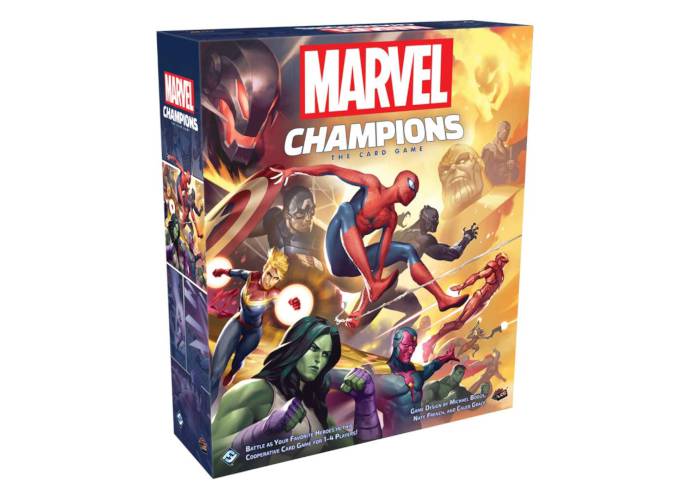
Designed by Michael Boggs, Nate French, Caleb Grace
Supports 1 to 4 players
About 45 to 90 minutes
Moderate complexity
8.1 on BGG
Like The Lord of the Rings: The Card Game, Marvel Champions: The Card Game is a living card game that evolves with every expansion.
In this one, you can play as numerous iconic Marvel Universe heroes: Iron Man, Black Panther, Spider-Man, and more. You construct a deck before you play, then use that deck during play to fight Marvel villains.
There are multiple scenarios that each play out differently with unique setups and challenges, all while you improve your deck between sessions so that you're more capable in future scenarios.
Of the three living card games featured in this article, Marvel Champions: The Card Game is the most beginner-friendly in terms of complexity, and it also supports four-player coop in the base game.
1. Arkham Horror: The Card Game
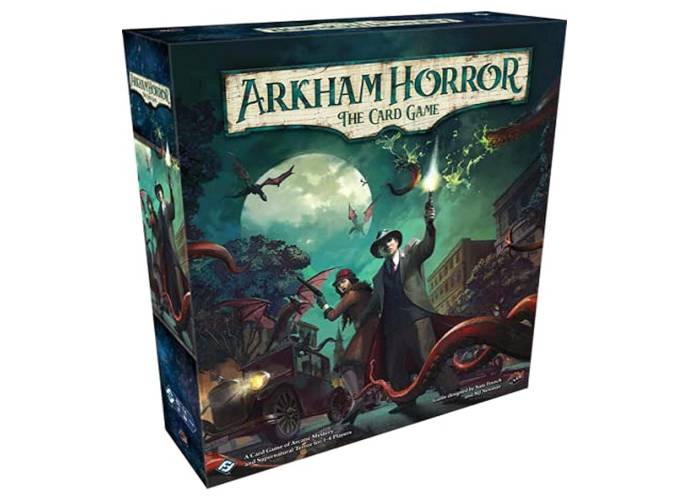
Designed by Nate French, Maxine Juniper Newman
Supports 1 to 4 players
About 60 to 120 minutes
Advanced complexity
8.8 on BGG
Like the previous two games, Arkham Horror: The Card Game is a living card game. The base game has tons of content, and you can expand gameplay further with additional expansions.
In this one, you're a paranormal investigator who's tasked with uncovering the Lovecraftian mysteries that plague the quiet town of Arkham—without losing your sanity along the way.
Played over numerous scenarios that comprise a campaign, Arkham Horror: The Card Game involves deck construction and upgrades between sessions that make you stronger and more capable.
Arkham Horror: The Card Game is the most complex of the living card games on this list, but that complexity shines and delivers one of the richest and most satisfying card game experiences.
